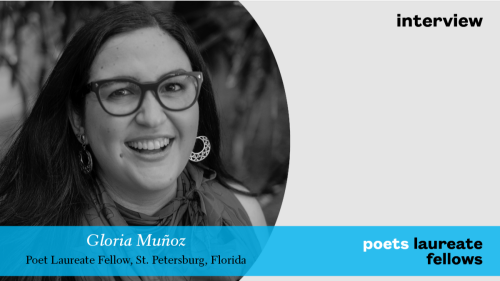
Gloria Muñoz is the author of Danzirly/Dawn’s Early (University of Arizona Press, 2021), which was selected for the 2019 Ambroggio Prize by Rosa Alcalá and awarded the 2021 Gold Medal Florida Book Award. She is also the author of the chapbook, Your Biome Has Found You (Finishing Line Press, 2017). In 2023, she was named an Academy of American Poets Laureate Fellow. Muñoz will launch the City of Writers Lab, which aims to connect youth and emerging poets with working writers through a series of programs including an after-school poetry and art program with NOMADstudio at the Pinellas Regional Juvenile Detention Center; a series of multigenerational community conversations with St. Pete Youth Farm featuring a poet and a local farmer, farmworker, or food activist; and workshops at Tombolo Books.
Poets.org: What made you want to become a poet laureate?
Gloria Muñoz: When I received a phone call telling me that I had been elected as one of the finalists to serve as poet laureate for my city, I was surprised. It was not something I had considered, but as the committee pointed out, the fact that I had already been doing a lot of creative writing and literary programming in my city would make the transition into the role smooth. Also, speaking to my predecessor and the very generous and kind humans who made up the selection committee helped me affirm that this was a worthwhile role. I love poetry, and this position has given me the opportunity to consider all that it can do across a city.
Poets.org: How has being a poet laureate changed your relationship to your own writing?
Muñoz: Well, I am laughing as I type this because my initial response is, “The occasion poem, oof!” Truthfully, the occasion poem is its own peculiar animal. I remember watching Richard Blanco read his poem “One Today” at President Obama’s inauguration and thinking that must be one of the most difficult kinds of poems to write. At the same time (and I know this because I heard Blanco speak about it at the Macondo Writers Workshop), writing these poems can also be a humbling honor. Ultimately, learning to write an occasion poem, sometimes very quickly due to a sudden deadline, has helped me trust my intuition more when drafting.
Poets.org: How can a poet or poetry bring a community together?
Muñoz: Poetry offers people a way into their big questions and deep considerations. It’s been one of my greatest teachers, and I think that people, as both individuals and communities collectively, are given room to learn, explore, play, and question through poetry. I’ve often thought that the world would be a little brighter if more people wrote poetry.
Poets.org: How does a poem begin for you?
Muñoz: It’s honestly always different:a question, an image, a conversation, a sound, a headline, my dog, walking, showering, seeing a good movie, chopping garlic, playing hide and seek with my kid, talking with friends about the future, noticing the moon, hearing live music, overhearing music across lanes of traffic; how sound travels and morphs as it moves so it sounds a little like howling.
Poets.org: Who introduced you to poetry?
Muñoz: My dad, Al Muñoz! He is a very talented poet in his own right. In addition to being a writer, my dad has always been an avid reader. One of the best gifts he gave me was reading novels with me as a kid.
Poets.org: How do you want to be remembered in your community?
Muñoz: As someone who cared.
Poets.org: Is there a poem that inspires you and your work in St. Petersburg, Florida? How so?
Every time someone shares a poem at a community workshop, I am inspired. There is something really wonderful that comes from a brave space that can only be built within a trusting community.
